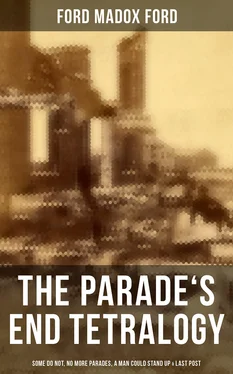‘Who’s Ashtaroth?’ Sylvia asked. ‘Astarte?’ and then: ‘Now, Father, after your experiences would you say the factory girls of Liverpool, or any other slum, are any better women than us that you used to look after?’
‘Astarte Syriaca,’ the Father said, ‘was a very powerful devil. There’s some that hold she’s not dead yet. I don’t know that I do myself.’
‘Well, I’ve done with her,’ Sylvia said.
The Father nodded:
‘You’ve had dealings with Mrs Profumo?’ he asked. ‘And that loathsome fellow . . . What’s his name?’
‘Does it shock you?’ Sylvia asked. ‘I’ll admit it was a bit thick . . . But I’ve done with it. I prefer to pin my faith to Mrs Vanderdecken. And, of course, Freud.’
The priest nodded his head and said:
‘Of course! Of course . . . ’
But Mrs Satterthwaite exclaimed, with sudden energy:
‘Sylvia Tietjens, I don’t care what you do or what you read, but if you ever speak another word to that woman, you never do to me!’
Sylvia stretched herself on her sofa. She opened her brown eyes wide and let the lids slowly drop again.
‘I’ve said once,’ she said, ‘that I don’t like to hear my friends miscalled. Eunice Vanderdecken is a bitterly misjudged woman. She’s a real good pal.’
‘She’s a Russian spy,’ Mrs Satterthwaite said.
‘Russian grandmother,’ Sylvia answered. ‘And if she is, who cares? She’s welcome for me . . . Listen now, you two. I said to myself when I came in: “I daresay I’ve given them both a rotten time.” I know you’re both more nuts on me than I deserve. And I said I’d sit and listen to all the pi-jaw you wanted to give me if I sat till dawn. And I will. As a return. But I’d rather you let my friends alone.’
Both the elder people were silent. There came from the shuttered windows of the dark room a low, scratching rustle.
‘You hear!’ the priest said to Mrs Satterthwaite. ‘It’s the branches,’ Mrs Satterthwaite answered.
The Father answered: ‘There’s no tree within ten yards! Try bats as an explanation.’
‘I’ve said I wish you wouldn’t, once,’ Mrs Satterthwaite shivered. Sylvia said:
‘I don’t know what you two are talking about. It sounds like superstition. Mother’s rotten with it.’
‘I don’t say that it’s devils trying to get in,’ the Father said. ‘But it’s just as well to remember that devils are always trying to get in. And there are especial spots. These deep forests are noted among others.’ He suddenly turned his back and pointed at the shadowy wall. ‘Who,’ he asked, ‘but a savage possessed by a devil could have conceived of that as a decoration?’ He was pointing to a life-sized, coarsely daubed picture of a wild boar dying, its throat cut, and gouts of scarlet blood. Other agonies of animals went away into all the shadows.
‘ Sport !’ he hissed. ‘It’s devilry!’
‘That’s perhaps true,’ Sylvia said. Mrs Satterthwaite was crossing herself with great rapidity. The silence remained.
Sylvia said:
‘Then if you’re both done talking I’ll say what I have to say. To begin with . . . ’ She stopped and sat rather erect, listening to the rustling from the shutters.
‘To begin with,’ she began again with impetus, ‘you spared me the catalogue of the defects of age; I know them. One grows skinny—my sort—the complexion fades, the teeth stick out. And then there is the boredom. I know it; one is bored . . . bored . . . bored! You can’t tell me anything I don’t know about that. I’m thirty. I know what to expect. You’d like to have told me, Father, only you were afraid of taking away from your famous man of the world effect—you’d like to have told me that one can insure against the boredom and the long, skinny teeth by love of husband and child. The home stunt! I believe it!
I do quite believe it. Only I hate my husband . . . and I hate . . . I hate my child.’
She paused, waiting for exclamations of dismay or disapprobation from the priest. These did not come.
‘Think,’ she said, ‘of all the ruin that child has meant for me; the pain in bearing him and the fear of death.’
‘Of course,’ the priest said, ‘child-bearing is for women a very terrible thing.’
‘I can’t say,’ Mrs Tietjens went on, ‘that this has been a very decent conversation. You get a girl . . . fresh from open sin, and make her talk about it. Of course you’re a priest and mother’s mother; we’re en famille . But Sister Mary of the Cross at the convent had a maxim: “Wear velvet gloves in family life.” We seem to be going at it with gloves off.’
Father Consett still didn’t say anything.
‘You’re trying, of course, to draw me,’ Sylvia said. ‘I can see that with half an eye . . . Very well then, you shall . . . ’
She drew a breath.
‘You want to know why I hate my husband. I’ll tell you; it’s because of his simple, sheer immorality. I don’t mean his actions; his views! Every speech he utters about everything makes me—I swear it makes me—in spite of myself, want to stick a knife into him, and I can’t prove he’s wrong, not ever, about the simplest thing. But I can pain him. And I will . . . He sits about in chairs that fit his back, clumsy, like a rock, not moving for hours . . . And I can make him wince. Oh, without showing it . . . He’s what you call loyal . . . oh, loyal . . . There’s an absurd little chit of a fellow . . . oh, Macmaster . . . and his mother . . . whom he persists in a silly mystical way in calling a saint . . . a Protestant saint! . . . And his old nurse, who looks after the child . . . and the child itself . . . I tell you I’ve only got to raise an eyelid . . . yes, cock an eyelid up a little when anyone of them is mentioned . . . and it hurts him dreadfully. His eyes roll in a sort of mute anguish . . . Of course he doesn’t say anything. He’s an English country gentleman.’
Father Consett said:
‘This immorality you talk about in your husband . . . I’ve never noticed it. I saw a good deal of him when I stayed with you for the week before your child was born. I talked with him a great deal. Except in the matter of the two communions—and even in these I don’t know that we differed so much—I found him perfectly sound.’
‘Sound.’ Mrs Satterthwaite said with sudden emphasis; ‘of course he’s sound. It isn’t even the word. He’s the best ever. There was your father, for a good man . . . and him. That’s an end of it.’
‘Ah,’ Sylvia said, ‘you don’t know . . . Look here. Try and be just. Suppose I’m looking at The Times at breakfast and say, not having spoken to him for a week: “It’s wonderful what the doctors are doing. Have you seen the latest?” And at once he’ll be on his high-horse—he knows everything!—and he’ll prove . . . prove . . . that all unhealthy children must be lethal-chambered or the world will go to pieces. And it’s like being hypnotised; you can’t think of what to answer him. Or he’ll reduce you to speechless rage by proving that murderers ought not to be executed. And then I’ll ask, casually, if children ought to be lethal-chambered for being constipated. Because Marchant—that’s the nurse—is always whining that the child’s bowels aren’t regular and the dreadful diseases that leads to. Of course that hurts him. For he’s perfectly soppy about that child, though he half knows it isn’t his own . . . But that’s what I mean by immorality. He’ll profess that murderers ought to be preserved in order to breed from because they’re bold fellows, and innocent little children executed because they’re sick . . . And he’ll almost make you believe it, though you’re on the point of retching at the ideas.’
Читать дальше












